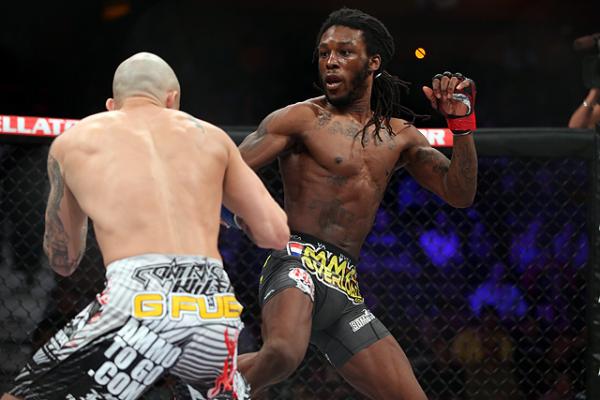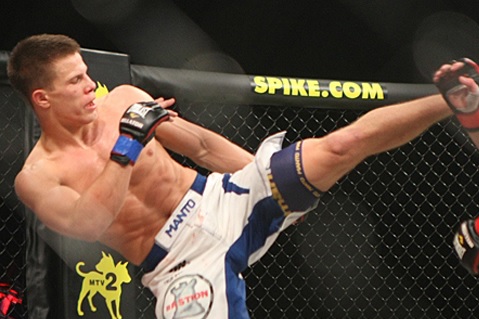 This Friday (May 9, 2014) will mark the first tournament final of Bellator’s tenth season, as Desmond Green takes on Daniel Weichel for a shot at the organization’s featherweight belt once the Pat Curran-Patricio Freire-Daniel Straus triangle gets sorted out. Five other tournament winners will be crowned in upcoming events as season ten closes out. Once those brackets have been decided Bellator will have had an even 50 tournaments completed. With such an even number, it’s only fitting that we take a deeper look at how tournament winners have been decided. Currently, 44 tournaments have taken place, but only 38 different fighters have won a tournament. Pat Curran, Joe Warren, Alexander Shlemenko, Patricio Freire, Douglas Lima and Rick Hawn have all won multiple tournaments. There is also an asterisk next to the tournament victory of Eric Prindle, as he never actually won a tournament final before being crowned tournament champion. Of course, one of the first things to look at is how finals have played out in respect to betting odds. Of those 44 tournaments, only 43 tournament finals have actually been contested due to the aforementioned Prindle situation. Surprisingly, only one final has had a pick ’em closing line at Several Bookmakers, Patricio Freire vs. Daniel Straus back at Bellator 45. That leaves us 42 points of data to work with to see if there are any trends to be found. Underdogs have enjoyed a solid success rate overall, winning 18 of those 42 bouts (42.86%) while favorites have obviously taken the other 24 (57.14%). It’s not necessarily that the odds have been particularly competitive in the finals either, as underdogs have only been expected to win 15 of those finals (or 35.71%) if the fights played out as the odds suggest. To put these numbers in perspective, across Bellator history (up until the end of season 9) underdogs had been successful 31.13% of the time (and only been expected to win 31.83% of all matches), meaning the boost in tournament finals is very significant (an 11.73% increase in winning rate, while the expected rate of victories has only increased by 3.88%). Clearly there lies some value in underdogs once tournaments come to a close. The tournament structure itself could be part of the reason for the more unpredictable results, as the closing bout of the bracket is usually the third in three months for the competitors and injuries or fatigue may come into play significantly more. One would think that due to recent exposure that bettors and oddsmakers would have an excellent read when it comes to tournament finals, but that doesn’t seem to be the case. In fact, earlier performances in the tournament (whether good or bad) may still be stuck in the heads of gamblers and skew their view on the bouts.
This Friday (May 9, 2014) will mark the first tournament final of Bellator’s tenth season, as Desmond Green takes on Daniel Weichel for a shot at the organization’s featherweight belt once the Pat Curran-Patricio Freire-Daniel Straus triangle gets sorted out. Five other tournament winners will be crowned in upcoming events as season ten closes out. Once those brackets have been decided Bellator will have had an even 50 tournaments completed. With such an even number, it’s only fitting that we take a deeper look at how tournament winners have been decided. Currently, 44 tournaments have taken place, but only 38 different fighters have won a tournament. Pat Curran, Joe Warren, Alexander Shlemenko, Patricio Freire, Douglas Lima and Rick Hawn have all won multiple tournaments. There is also an asterisk next to the tournament victory of Eric Prindle, as he never actually won a tournament final before being crowned tournament champion. Of course, one of the first things to look at is how finals have played out in respect to betting odds. Of those 44 tournaments, only 43 tournament finals have actually been contested due to the aforementioned Prindle situation. Surprisingly, only one final has had a pick ’em closing line at Several Bookmakers, Patricio Freire vs. Daniel Straus back at Bellator 45. That leaves us 42 points of data to work with to see if there are any trends to be found. Underdogs have enjoyed a solid success rate overall, winning 18 of those 42 bouts (42.86%) while favorites have obviously taken the other 24 (57.14%). It’s not necessarily that the odds have been particularly competitive in the finals either, as underdogs have only been expected to win 15 of those finals (or 35.71%) if the fights played out as the odds suggest. To put these numbers in perspective, across Bellator history (up until the end of season 9) underdogs had been successful 31.13% of the time (and only been expected to win 31.83% of all matches), meaning the boost in tournament finals is very significant (an 11.73% increase in winning rate, while the expected rate of victories has only increased by 3.88%). Clearly there lies some value in underdogs once tournaments come to a close. The tournament structure itself could be part of the reason for the more unpredictable results, as the closing bout of the bracket is usually the third in three months for the competitors and injuries or fatigue may come into play significantly more. One would think that due to recent exposure that bettors and oddsmakers would have an excellent read when it comes to tournament finals, but that doesn’t seem to be the case. In fact, earlier performances in the tournament (whether good or bad) may still be stuck in the heads of gamblers and skew their view on the bouts.  Given the tournament format, another factor which could play a big role by the time the third fight takes place is age. Conventional wisdom would state that a younger fighter has a better ability to recover between fights and come back at full strength. That has normally proven correct, as the younger tournament finalist has posted a record of 25-18, or a winning percentage of 58.14%. The advantage really only appears when the age difference increases. When there is a gap of three years or more — which has occurred 26 times — the younger fighter has been victorious 17 times (65.38% of the time). When the difference is five years or more — 18 times — youth has prevailed 12 times (66.67%). However the older fighter actually holds a slightly better record when the difference is less than three years (9-8), so be wary if you’re looking to place a bet based on this factor. This week’s featherweight final falls under the three year parameter (Desmond Green is 4 years and 11 months younger than Daniel Weichel), which does seem to favor the wrestler slightly in what has turned into a near pick ’em bout. Green is currently -140 (bet $140 to win $100) while Weichel is +110 (bet $100 to win $110). The remaining season ten finals feature one other bout in the three-year threshold (Andrey Koreshkov is also 4 years and 11 months younger than his opponent, Adam McDonough) and one in the five-year range (Marcin Held is six years the junior of Patricky Freire). The other three finals don’t have a big difference in age, so other factors will be needed to determine an edge in those contests. So what we’ve learned from a bit of analysis in Bellator tournament finals is that underdogs perform significantly better than the odds suggest they will (approximately 22% when the extra juice at the books is taken into account), and youth is an asset as the brackets play out, so long as the ages are fairly disparate (three years or more). How this affects the featherweight final at Bellator 119 is interesting, as Weichel opened at +130 and has seen steady action to bring him down to +110, meaning the public does like his chances in this bout as a slight dog. The age factor is not in the German’s favor however, so perhaps some of the money coming in is misguided. Looking at the remaining slate of tournament bouts, a pair of underdogs I’m going to look at a bit further are Muhammed Lawal and Brandon Halsey (assuming his bout with Cooper gets rescheduled).
Given the tournament format, another factor which could play a big role by the time the third fight takes place is age. Conventional wisdom would state that a younger fighter has a better ability to recover between fights and come back at full strength. That has normally proven correct, as the younger tournament finalist has posted a record of 25-18, or a winning percentage of 58.14%. The advantage really only appears when the age difference increases. When there is a gap of three years or more — which has occurred 26 times — the younger fighter has been victorious 17 times (65.38% of the time). When the difference is five years or more — 18 times — youth has prevailed 12 times (66.67%). However the older fighter actually holds a slightly better record when the difference is less than three years (9-8), so be wary if you’re looking to place a bet based on this factor. This week’s featherweight final falls under the three year parameter (Desmond Green is 4 years and 11 months younger than Daniel Weichel), which does seem to favor the wrestler slightly in what has turned into a near pick ’em bout. Green is currently -140 (bet $140 to win $100) while Weichel is +110 (bet $100 to win $110). The remaining season ten finals feature one other bout in the three-year threshold (Andrey Koreshkov is also 4 years and 11 months younger than his opponent, Adam McDonough) and one in the five-year range (Marcin Held is six years the junior of Patricky Freire). The other three finals don’t have a big difference in age, so other factors will be needed to determine an edge in those contests. So what we’ve learned from a bit of analysis in Bellator tournament finals is that underdogs perform significantly better than the odds suggest they will (approximately 22% when the extra juice at the books is taken into account), and youth is an asset as the brackets play out, so long as the ages are fairly disparate (three years or more). How this affects the featherweight final at Bellator 119 is interesting, as Weichel opened at +130 and has seen steady action to bring him down to +110, meaning the public does like his chances in this bout as a slight dog. The age factor is not in the German’s favor however, so perhaps some of the money coming in is misguided. Looking at the remaining slate of tournament bouts, a pair of underdogs I’m going to look at a bit further are Muhammed Lawal and Brandon Halsey (assuming his bout with Cooper gets rescheduled).